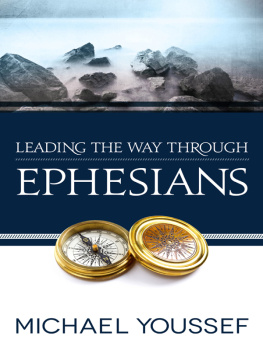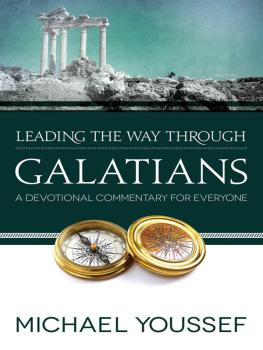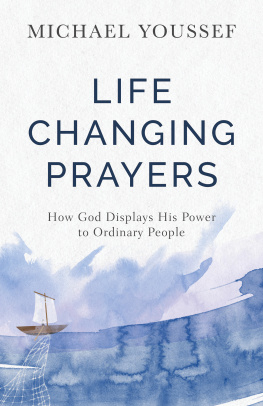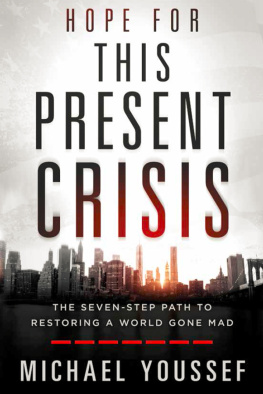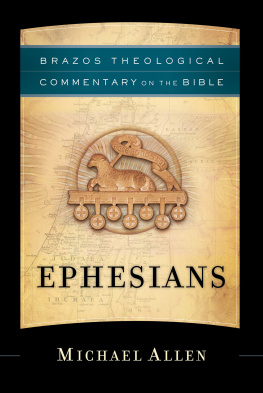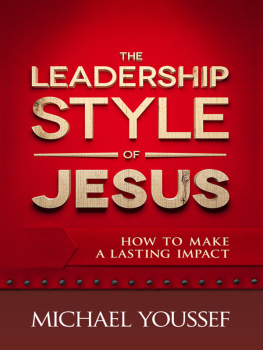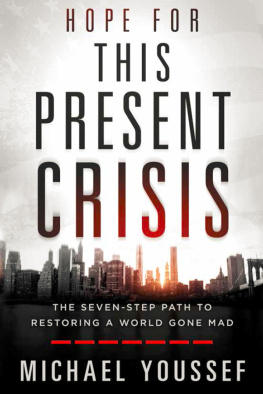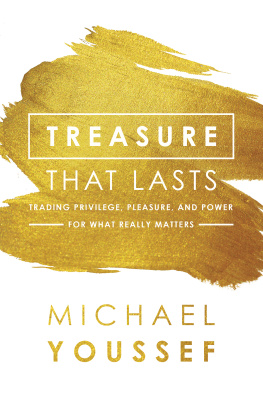Michael Youssef - Leading the Way Through Ephesians
Here you can read online Michael Youssef - Leading the Way Through Ephesians full text of the book (entire story) in english for free. Download pdf and epub, get meaning, cover and reviews about this ebook. publisher: Harvest House Publishers, genre: Religion. Description of the work, (preface) as well as reviews are available. Best literature library LitArk.com created for fans of good reading and offers a wide selection of genres:
Romance novel
Science fiction
Adventure
Detective
Science
History
Home and family
Prose
Art
Politics
Computer
Non-fiction
Religion
Business
Children
Humor
Choose a favorite category and find really read worthwhile books. Enjoy immersion in the world of imagination, feel the emotions of the characters or learn something new for yourself, make an fascinating discovery.
- Book:Leading the Way Through Ephesians
- Author:
- Publisher:Harvest House Publishers
- Genre:
- Rating:3 / 5
- Favourites:Add to favourites
- Your mark:
- 60
- 1
- 2
- 3
- 4
- 5
Leading the Way Through Ephesians: summary, description and annotation
We offer to read an annotation, description, summary or preface (depends on what the author of the book "Leading the Way Through Ephesians" wrote himself). If you haven't found the necessary information about the book — write in the comments, we will try to find it.
Leading the Way Through Ephesians — read online for free the complete book (whole text) full work
Below is the text of the book, divided by pages. System saving the place of the last page read, allows you to conveniently read the book "Leading the Way Through Ephesians" online for free, without having to search again every time where you left off. Put a bookmark, and you can go to the page where you finished reading at any time.
Font size:
Interval:
Bookmark:



HARVEST HOUSE PUBLISHERS
EUGENE, OREGON
This publication contains The Holy Bible, English Standard Version, copyright 2001 by Crossway, a publishing ministry of Good News Publishers. The ESV text appearing in this publication is reproduced and published by cooperation between Crossway and Harvest House Publishers and by permission of Good News Publishers. Unauthorized reproduction of this publication is prohibited.
The Holy Bible, English Standard Version (ESV) is adapted from the Revised Standard Version of the Bible, copyright Division of Christian Education of the National Council of the Churches of Christ in the U.S.A. All rights reserved.
English Standard Version, ESV and the ESV logo are trademarks of Good News Publishers located in Wheaton, Illinois. Used by permission.
Cover design by Harvest House Publishers, Inc., Eugene, Oregon
Cover photo iStockphoto.com/erhandayi, BrianAJackson
Published in association with the literary agency of Wolgemuth & Associates. Inc.
Leading the Way Through Ephesians
Copyright 2012 by Michael Youssef
Published by Harvest House Publishers
Eugene, Oregon 97402
www.harvesthousepublishers.com
Library of Congress Cataloging-in-Publication Data
Youssef, Michael.
Leading the way through Ephesians / Michael Youssef.
p. cm.
Includes bibliographical references.
ISBN 978-0-7369-5162-3 (pbk.)
ISBN 978-0-7369-5163-0 (eBook)
1. Bible. N.T. EphesiansCommentaries. I. Title.
BS2695.53.Y68 2012
227.507dc23
2012015995
All rights reserved. No part of this publication may be reproduced, stored in a retrieval system, or transmitted in any form or by any meanselectronic, mechanical, digital, photocopy, recording, or any otherexcept for brief quotations in printed reviews, without the prior permission of the publisher.
To all faithful preachers, teachers, and Christian leaders who seek to accurately expound the Word of God from pulpits or in Sunday school classes or in home Bible study groups.
First, I offer all my thanksgiving to the Father in heaven whose Holy Spirit has laid on my heart the writing of this series for the glory of Jesus. I am also immensely grateful to the Lord for sending me an able and gifted editor and compiler of my material in Jim Denney.
Special thanks to the entire team at Harvest House Publishersand especially to Bob Hawkins Jr., LaRae Weikert, and Rod Morris, who shared my vision and made this dream a reality.
My expression of thanks would not be complete without mentioning the patience and perseverance of Robert and Andrew Wolgemuth of Wolgemuth and Associates, Inc. literary agency for managing the many details of such an undertaking.
My earnest prayer is that, as I leave this legacy to the next generation, God would raise up great men and women to faithfully serve their generation by accurately interpreting the Word of God.
W hen I was growing up in Egypt, we lived next door to a wealthy eccentric who owned a great deal of real estate. In spite of his vast wealth, he lived like the poorest of the poor. He could have easily afforded a private doctor, yet when he or his wife needed medical attention, they would stand in line for hours at the government-run health clinic. Instead of enjoying fine dining at elegant restaurants, he and his wife bought the cheapest food and often went without meals in order to scrimp and save.
Here was a man who lived in poverty even though he possessed great wealth. After he died, the people who settled his estate found large cans of money that he had hidden throughout his house. It was money he never used or enjoyed, money that did him no good whatsoever.
We shake our heads in amazement and wonder, How can a man of such wealth choose to live like a pauper? Yet I find that many Christians have a lot in common with this man. Many of us truly live in spiritual poverty, even to the point of spiritual malnutrition, while we have at our fingertips an infinite supply of spiritual riches.
In Ephesians, the apostle Paul reveals to us the spiritual blessings we have in Christ Jesus. Through the years, this letter has been described as:
the believers bank
the Christians checkbook and
the treasure house of the Bible
Ephesians explains how, by means of the death and resurrection of Jesus Christ, we have access to the limitless riches and power of the Holy Spirit. Ephesians is as foundational to an understanding of the New Testament as the book of Joshua is to the Old Testament.
The letter we call Ephesians was probably not written specifically or solely to the Christians in the city of Ephesus. The commonly accepted text of Ephesians begins with this greeting:
Paul, an apostle of Christ Jesus by the will of God,
To the saints who are in Ephesus, and are faithful in Christ Jesus:
Grace to you and peace from God our Father and the Lord Jesus Christ (Ephesians 1:1-2).
The best and earliest Greek manuscripts of Ephesians, however, do not contain the phrase who are in Ephesus. The best manuscripts read simply, To the saints, the faithful in Christ Jesus. This suggests that the phrase who are in Ephesus was not written by Paul, but was added later. The Book of Acts tells us that Paul of Tarsus spent a great deal of time in the church at Ephesus, yet this letter makes no reference to people Paul knew in Ephesus or his experiences among them. Instead, Paul seems to know the readers of this letter by reputation, not personal acquaintance, because he writes in 1:15, because I have heard of your faith in the Lord Jesus and your love toward all the saints
The Ephesian believers were certainly among Pauls intended recipients for this letter, but its likely that this letter was actually written to the Christians in several cities (including Ephesus) in a wider region of western Asia Minor (modern-day Turkey). Pauls letters were customarily copied and circulated among the cities throughout the regions where they were sent.
Its interesting to note that at the end of Pauls letter to the Colossians (which he wrote from prison at about the same time he wrote Ephesians), he writes:
And when this letter has been read among you, have it also read in the church of the Laodiceans; and see that you also read the letter from Laodicea (Colossians 4:16).
The city of Laodicea was not far from Ephesus, and the letter Paul mentions, the letter to the Laodiceans, is unknown to us today. Its intriguing to speculate that the letter we call Ephesians might in fact be the letter to the Laodiceans that Paul mentions in Colossians. In all probability, Ephesians was originally read in all the churches in western Asia Minor, including Ephesus and Laodicea, and this may account for the seemingly lost letter to the Laodiceans.
The fact that we do not know for certain to whom Ephesians was originally written does not take away from the message or the majesty of this book. It is clearly written by Paul under the inspiration of the Holy Spirit, and it sets forth some of Pauls most essential teaching on the nature of the church, the body of Christ.
The apostle Paul wrote this letter while he was imprisoned in Rome, probably around AD 62. Paul wrote the letters of Colossians and Philemon from prison at about the same time as this letter. He states the theme of the letter at the outset:
Next pageFont size:
Interval:
Bookmark:
Similar books «Leading the Way Through Ephesians»
Look at similar books to Leading the Way Through Ephesians. We have selected literature similar in name and meaning in the hope of providing readers with more options to find new, interesting, not yet read works.
Discussion, reviews of the book Leading the Way Through Ephesians and just readers' own opinions. Leave your comments, write what you think about the work, its meaning or the main characters. Specify what exactly you liked and what you didn't like, and why you think so.

